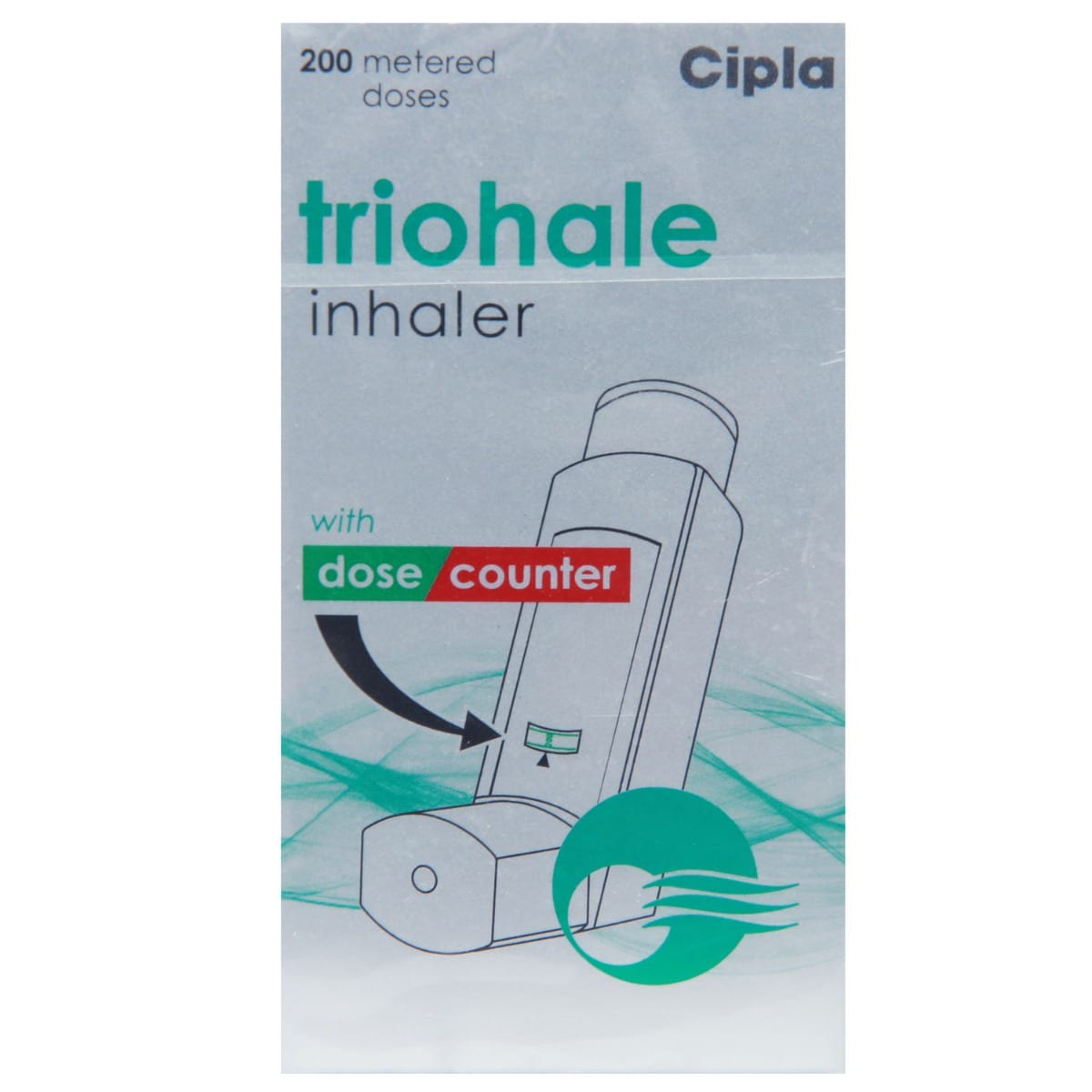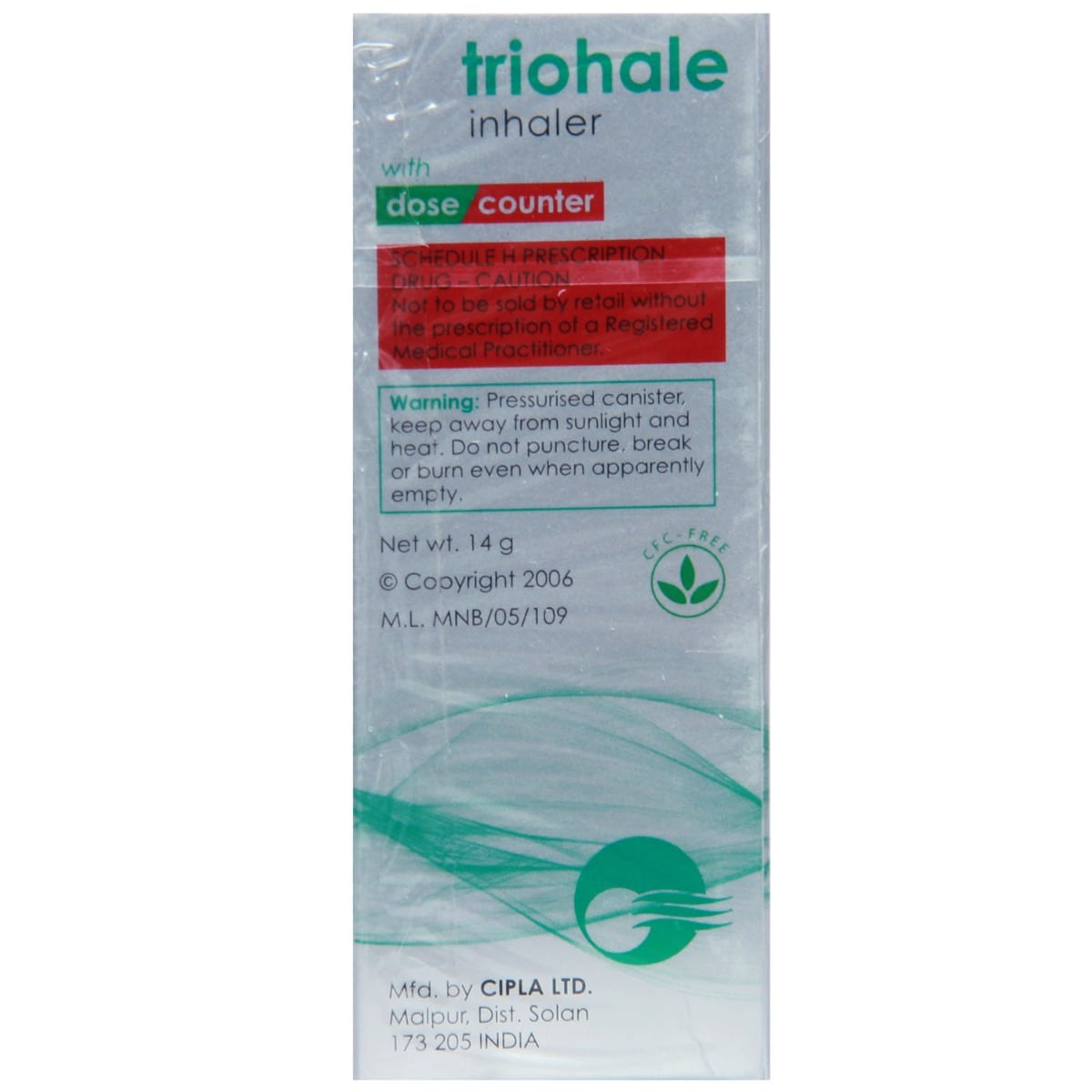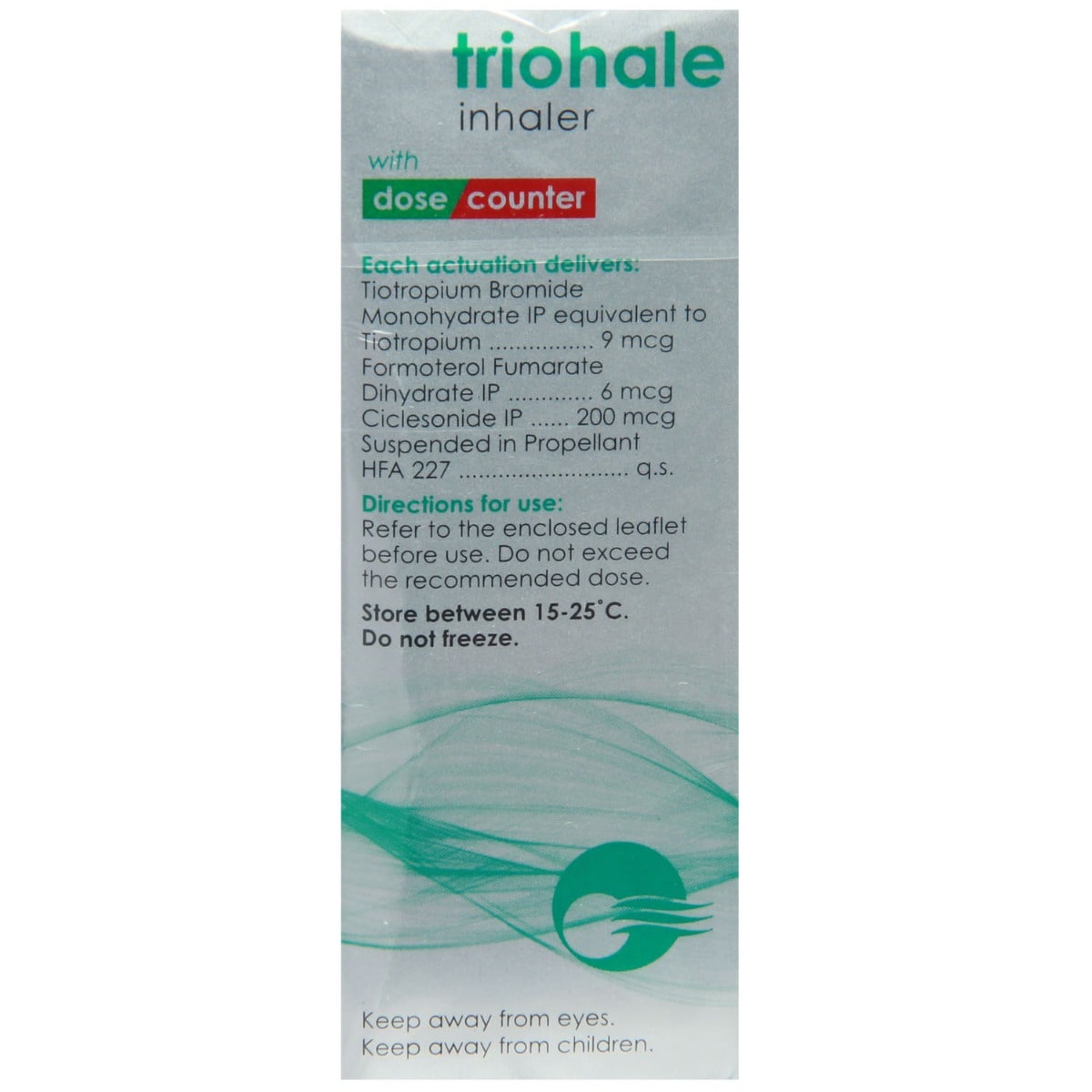Triohale Inhaler
MRP ₹1284
(Inclusive of all Taxes)
₹192.6 Cashback (15%)
Provide Delivery Location
Online payment accepted
 Prescription drug
Prescription drugWhats That
Composition :
Manufacturer/Marketer :
Consume Type :
Expires on or after :
Return Policy :
About Triohale Inhaler
Triohale Inhaler belongs to the class 'respiratory stimulants', which are primarily used to treat asthma symptoms and chronic obstructive pulmonary diseases (COPD). Asthma is a chronic (long-term) respiratory condition in which airways narrow, swell, and produce extra mucus, leading to difficulty breathing. COPD is a group of lung diseases with emphysema (shortness of breath) and chronic bronchitis (inflammation of the lining of bronchial tubes).
Triohale Inhaler is a combination of three drugs: Tiotropium (anti-cholinergic), Formoterol (LABA - long-acting beta-agonists or bronchodilator), and ciclesonide (corticosteroid). Tiotropium is an anti-cholinergic, and formoterol is a bronchodilator. Both medicines work by relaxing the airway muscles and widen the airways. These medicines together making it easier for asthma and COPD patients to breathe. Whereas ciclesonide is a corticosteroid, it acts by stopping the release of certain natural substances in the body that are responsible for inflammation of the airways.
Your doctor will recommend how often you take Triohale Inhaler based on your medical condition. Some people may experience side effects like a fungal infection in the mouth, vomiting, nausea, headache, sore throat, hoarse voice, upper respiratory tract infection, flu, cough, Musculoskeletal (bone, muscle, or joint) pain, increased heart rate, and trembling. Most of these side effects of Triohale Inhaler do not require medical attention and gradually resolve over time. However, if the side effects persist or worsen, stop the medicine and consult your doctor.
If you are allergic to lactose (a form of sugar) or have lactose intolerance, Triohale Inhaler, or any other ingredients, please tell your doctor. If you are pregnant or breastfeeding, it is advised to inform your doctor before using Triohale Inhaler. Triohale Inhaler is not recommended for children below 6 years of age. If your breathing worsens or you often wake up at night with asthma, experience chest tightness in the morning, or last longer than usual, please consult a doctor immediately. These might be signs indicating that your asthma is not controlled properly and requires an alternate or additional treatment. Regular monitoring of potassium levels is recommended while taking Triohale Inhaler as it may cause low potassium levels in the blood. If you have high blood pressure, diabetes, hypokalaemia (low potassium levels in the blood), glaucoma, cataracts, osteoporosis (weak bones), fits, immune system problems, chickenpox, measles, thyroid, lung, heart, liver, or adrenal gland problems, tuberculosis inform your doctor before taking Triohale Inhaler. Triohale Inhaler should be used with caution in patients with narrow-angle glaucoma, prostatic hyperplasia, or bladder neck obstruction.
Uses of Triohale Inhaler
Directions for Use
Key Benefits
Triohale Inhaler is a combination of three drugs: Tiotropium (anti-cholinergic), Formoterol (LABA - long-acting beta-agonists or bronchodilator), and ciclesonide (corticosteroid). Tiotropium is an anti-cholinergic, and formoterol is a bronchodilator. Both medicines work by relaxing the airway muscles and widen the airways. These medicines together making it easier for asthma and COPD patients to breathe. Whereas ciclesonide is a corticosteroid, it acts by stopping the release of certain natural substances in the body that are responsible for inflammation of the airways.
Storage
- Inform your doctor about the symptoms you're experiencing due to medication.
- Your doctor may adjust your treatment plan, which could include changing your medication, adding new medications, or offering advice on managing your symptoms.
- Practice good hygiene, including frequent handwashing, avoiding close contact with others, and avoiding sharing utensils or personal items.
- Stay hydrated by drinking plenty of fluids to help loosen and clear mucus from your nose, throat, and airways.
- Get plenty of rest and engage in stress-reducing activities to help your body recover. If your symptoms don't subside or worsen, consult your doctor for further guidance.
- Inform your doctor about dry mouth symptoms. They may adjust your medication regimen or prescribe additional medications to manage symptoms.
- Drink plenty of water throughout the day to help keep your mouth moist and alleviate dry mouth symptoms.
- Chew sugar-free gum or candies to increase saliva production and keep your mouth moisturized.
- Use saliva substitutes, such as mouthwashes or sprays, only if your doctor advises them to help moisturize your mouth and alleviate dry mouth symptoms.
- Avoid consuming smoking, alcohol, spicy or acidic foods, and other irritants that may aggravate dry mouth symptoms.
- Schedule regular dental check-ups to keep track of your oral health and handle any dry mouth issues as they arise.
- Focus on eating nutrient-rich foods such as citrus fruits, spinach, ginger, garlic, turmeric, and fermented foods to improve immunity and general health.
- Drink plenty of water to stay hydrated, and think about taking probiotics, zinc, vitamin C, and vitamin D supplements.
- Adopt healthful practices such as leading a balanced lifestyle and remaining at home when necessary.
- Consult your doctor if you experience symptoms of sinusitis, such as nasal congestion, facial pain, or headaches, which may be triggered by your medication.
- Your doctor may adjust your treatment plan by changing your medication, adding new medications, or providing guidance on managing your sinusitis symptoms.
- Practice good hygiene, including frequent handwashing, avoiding close contact with others, and avoiding sharing utensils or personal items.
- If your doctor advises, you can use nasal decongestants or saline nasal sprays to help relieve nasal congestion and sinus pressure.
- To help your body recover, get plenty of rest, stay hydrated, and engage in stress-reducing activities. If your symptoms persist or worsen, consult your doctor for further guidance.
- To keep your vocal cords lubricated and hydrated, drink lots of water.
- Suck on ice chips, popsicles, or lozenges to clear your throat and reduce hoarseness.
- Your voice cords may be soothed and healed by honey's antibacterial and anti-inflammatory properties.
- Gargle with salt water.
- Using a steam humidifier or inhaling steam might help minimize hoarseness and release mucus.
- Rest well; get enough sleep. This helps the body fight infection.
- Keep yourself hydrated by drinking enough water and other fluids.
- Wash your hands often and avoid touching your eyes, mouth or nose.
- Wear a mask whilst going out.
- Warm steam or a hot shower may help with nose secretions.
- Avoid contact with others to prevent contamination.
- Inform your doctor about the common cold symptoms you're experiencing due to medication.
- Your doctor may adjust your treatment plan, which could include changing your medication, adding new medications, or offering advice on managing your symptoms.
- Practice good hygiene, including frequent handwashing, avoiding close contact with others, and avoiding sharing utensils or personal items.
- Drink plenty of fluids, such as warm water or soup, to help thin out mucus.
- Get plenty of rest and engage in stress-reducing activities to help your body recover. If your symptoms don't subside or worsen, consult your doctor for further guidance.
Drug Warnings
If you are allergic to lactose (a form of sugar) or have lactose intolerance, Triohale Inhaler, or any other ingredients, please tell your doctor. If you are pregnant or breastfeeding, it is advised to inform your doctor before using Triohale Inhaler. Triohale Inhaler is not recommended for children below 6 years of age. If your breathing worsens or you often wake up at night with asthma, experience chest tightness in the morning, or last longer than usual, please consult a doctor immediately. These might be signs indicating that your asthma is not controlled properly and requires an alternate or additional treatment. Regular monitoring of potassium levels is recommended while taking Triohale Inhaler as it may cause low potassium levels in the blood. If you have high blood pressure, diabetes, hypokalaemia (low potassium levels in the blood), glaucoma, cataracts, osteoporosis (weak bones), epilepsy, immune system problems, chickenpox, measles, thyroid, lung, heart, liver, or adrenal gland problems, tuberculosis inform your doctor before taking Triohale Inhaler. Triohale Inhaler should be used with caution in patients with narrow-angle glaucoma, prostatic hyperplasia, or bladder neck obstruction.
Drug-Drug Interactions
Drug-Drug Interactions
Login/Sign Up
Co-administration of Bumetanide and Desmopressin may increase the risk of hyponatremia (low levels of salt in the blood).
How to manage the interaction:
If you have to use Desmopressin and Triohale Inhaler together, a doctor may adjust the dose or monitor you more frequently to safely use both medications. However, if you experience loss of appetite, headache, nausea, vomiting, lethargy (very tired), irritability, difficulty concentrating, weakness, unsteadiness, memory impairment, confusion, muscle spasm, decreased urination, and/or sudden weight gain, contact your doctor immediately as these may be symptoms of water intoxication (water poisoning) and hyponatremia (low levels of salt in the blood). Do not discontinue the medication without consulting a doctor.
Co-administration of labetalol and Triohale Inhaler together could decrease the effects of both medications.
How to manage the interaction:
Although taking Labetalol and Triohale Inhaler together can result in an interaction, it can be taken if a doctor has prescribed it. However, if you experience any unusual symptoms contact a doctor immediately. Do not stop using any medications without talking to a doctor.
Using Triohale Inhaler and Carvedilol together may reduce the effects of both medications.
How to manage the interaction:
Although there is an interaction between Triohale Inhaler and Carvedilol, they can be taken together if prescribed by a doctor. Do not discontinue any medications without consulting a doctor.
Using Triohale Inhaler together with metipranolol can reduce the effects of both medications.
How to manage the interaction:
Although there is an interaction between Triohale Inhaler and metipranolol, they can be taken together if prescribed by your doctor. However, if you experience any unusual symptoms contact your doctor immediately. Do not stop using any medications without first talking to your doctor.
Taking ribociclib together with Triohale Inhaler can increase the risk of an irregular heart rhythm
How to manage the interaction:
Co-administration of Triohale Inhaler with Ribociclib can possibly result in an interaction, but it can be taken if your doctor has advised it. However, if you experience sudden dizziness, lightheadedness, fainting, or shortness of breath, contact your doctor right away. Do not stop using any medications without first talking to your doctor.
Using epinephrine together with Triohale Inhaler may increase the risk of irregular heart rhythm.
How to manage the interaction:
Although taking Triohale Inhaler and Epinephrine together can cause an interaction, it can be taken if your doctor has suggested it. However, if you experience any unusual symptoms contact your doctor immediately. Do not stop using any medications without first talking to your doctor.
Using Triohale Inhaler with pindolol together could decrease the effects of both medications.
How to manage the interaction:
Although there is an interaction between Triohale Inhaler and Pindolol, they can be taken together if prescribed by your doctor. However, if you experience any unusual symptoms contact your doctor immediately. Do not stop using any medications without first talking to your doctor.
Taking carteolol with Triohale Inhaler can reduce the effects of both drugs.
How to manage the interaction:
Although there is an interaction between Carteolol and Triohale Inhaler, they can be taken together if prescribed by a doctor. Do not discontinue any medications without consulting a doctor.
Taking timolol with Triohale Inhaler could reduce the benefits of both medications because they have opposite effects on the body.
How to manage the interaction:
Although taking Triohale Inhaler and timolol together can possibly result in an interaction, it can be taken if your doctor has advised it. However, if you experience any unusual symptoms, contact your doctor immediately. Do not stop using any medications without talking to your doctor.
Taking nadolol with Triohale Inhaler together could decrease the effects of both medications.
How to manage the interaction:
There may be a possibility of interaction between Triohale Inhaler and Nadolol, but it can be taken if prescribed by a doctor. However, if you experience any unusual symptoms contact your doctor immediately. Do not stop using any medications without first talking to your doctor.
Drug-Food Interactions
Drug-Food Interactions
Login/Sign Up
Diet & Lifestyle Advise
- Eat a healthy diet and exercise regularly to strengthen your breathing muscles and boost your immune system.
- Avoid foods such as cabbage, beans, garlic, onions, shrimp, pickled food, dried fruits, fried foods, carbonated drinks, wine, bottled lemon, and lime juice as it may worsen asthma symptoms.
- Do meditation, deep breathing, regular exercise, and try progressive muscle relaxation techniques to get relief from stress and reduce the risk of an asthma attack.
- Quit smoking as it may reduce the effectiveness of the Triohale Inhaler and irritate the lungs worsening breathing problems.
- Learning breathing exercises will help you move more air in and out of your lungs.
- Limit alcohol intake.
Side Effects of Triohale Inhaler
- Fungal infection in the mouth
- Vomiting
- Nausea
- Headache
- Sore throat, hoarse voice
- Upper respiratory tract infection
- Flu, cough
- Musculoskeletal pain (bone, muscle or joint)
- Increased heart rate
- Increased intraocular pressure (pressure inside the eye is higher than normal)
- Shaking or trembling
Habit Forming
Therapeutic Class
All Substitutes & Brand Comparisons
RX
Triohale Inhaler 120 mdi
Cipla Ltd
₹1284
(₹9.63/ 1MDI)
66% COSTLIER
Drug-Diseases Interactions
Drug-Diseases Interactions
Login/Sign Up
FAQs
Drug-Drug Interactions Checker List
- ALBUTEROL
- PREDNISONE
- FUROSEMIDE
- AMILORIDE
- ASPIRIN
- AZITHROMYCIN
- DULOXETINE
- METOPROLOL
- KETOCONAZOLE
- RITONAVIR
- PHENELZINE
- POSACONAZOLE
- ITRACONAZOLE
- VORICONAZOLE
Special Advise
- You are advised to rinse your mouth with water after each dose of Triohale Inhaler because it not only removes the taste of medicine inhaled but also helps to avoid fungal infections (oral thrush) in the mouth and throat. After rinsing your mouth thoroughly, you may drink water, milk, or any liquids.
- Your doctor may advise regular monitoring of potassium, as the use of Triohale Inhaler may affect the body's potassium levels.
Disease/Condition Glossary
Asthma: It is a chronic (long-term) respiratory condition in which airways narrow, swell, and produce extra mucus leading to difficulty in breathing. The symptoms of asthma include wheezing (whistling sound while breathing), shortness of breath, chest tightness, and cough, especially at night. The symptoms of mild persistent asthma may occur more than 2 times a week and up to 4 nights in a month, whereas, in the case of severe persistent asthma, the symptoms occur several times every day and most nights. The treatment for asthma includes medication, breathing exercises, and self-care.
Chronic obstructive pulmonary disease (COPD): It is a group of lung diseases with emphysema (shortness of breath) and chronic bronchitis (inflammation of the lining of bronchial tubes). The major cause of COPD is smoking tobacco. Also, long-term exposure to fumes and chemicals may lead to COPD. The symptoms include chronic cough, shortness of breath, or wheezing (whistle sound while breathing).

Have a query?
Alcohol
Safe if prescribed
The interaction of Triohale Inhaler with alcohol is unknown. Please consult a doctor before consuming alcohol with Triohale Inhaler.
Pregnancy
Consult your doctor
The safety of Triohale Inhaler in pregnant women is unknown. Therefore, it is given to pregnant women only if the doctor thinks the benefits outweigh the risks.
Breast Feeding
Consult your doctor
It is unknown whether Triohale Inhaler is excreted in human milk. It is given to breastfeeding mothers only if the doctor thinks benefits are greater than risks.
Driving
Safe if prescribed
Triohale Inhaler usually does not affect your ability to drive or operate machinery.
Liver
Consult your doctor
Use Triohale Inhaler with caution, especially if you have a history of Liver diseases/conditions. The dose may be adjusted by your doctor as required.
Kidney
Consult your doctor
If you have any concerns regarding the use of Triohale Inhaler in patients with Kidney problems, please consult your doctor.
Children
Safe if prescribed
Safe for children below 12 years(Content) Triohale Inhaler is not recommended for children below 6 years as the safety and effectiveness were not established. However, please consult a doctor before giving Triohale Inhaler to children.












